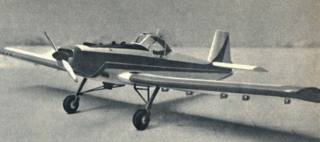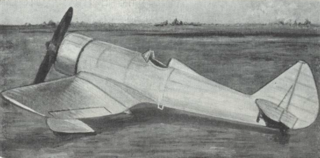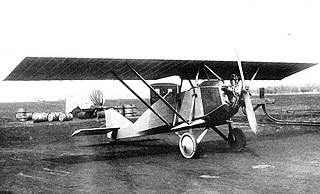
The IAR 79 was a twin-engine bomber and military reconnaissance aircraft with a wood and metal structure that saw service in World War II built under licence in Brasov, Romania, by Industria Aeronautică Română

The LWS-2 was the Polish air ambulance aircraft prototype, designed in the late-1930s in the LWS factory.

The RWD-10 was a Polish aerobatics sports plane, single-seat parasol wing monoplane, used from 1933 to 1939 and constructed by the RWD team.

The PWS-10 was a Polish fighter aircraft, constructed in the PWS. It was the first Polish-designed fighter to enter serial production.

The PZL P.6 was a Polish fighter, designed by the engineer Zygmunt Puławski, manufactured by PZL state-owned factory. It remained a prototype and did not go into production.

PZL.26 was a Polish sports plane built in 1934 by the Państwowe Zakłady Lotnicze. Ordered by the Ministry of Defence, it was specifically designed for the upcoming Challenge 1934 International Touring Aircraft Contest.

The PZL P.1 was a Polish fighter, designed by the engineer Zygmunt Puławski, manufactured by the PZL state-owned factory. It remained a prototype, but it was the first of the Polish PZL gull wing fighter series, leading to the PZL P.7, PZL P.11 and PZL P.24.

The PWS-20 was a Polish single-engine high-wing 8 passenger airliner, built in the PWS factory and when it made its first flight in 1929 it became the first Polish-designed transport aircraft to fly.

The PWS-1 was a Polish two-seat fighter and reconnaissance aircraft constructed by Podlaska Wytwórnia Samolotów (PWS) in 1927. It remained a prototype for its entire lifespan.

The Polikarpov I-3 was a Soviet fighter designed during the late 1920s. It entered service in 1929, but was retired in 1935 with the advent of fighters with higher performance.

The IAR-822 was an agricultural aircraft built in Romania in the 1960s. Based on the IAR-821, it was a conventional low-wing monoplane with fixed, tailwheel undercarriage and differed from its predecessor mainly in the choice of a horizontally opposed engine in place of a radial.

The RWD 16bis and RWD 21 were Polish two-seat low-wing touring and sports planes of the late 1930s, constructed by the RWD bureau, sharing the same construction, main difference of the RWD 21 being a stronger engine.

The IAR 15 was a low-wing monoplane fighter designed in Romania in 1933. Designed by Elie Carafoli for the Romanian Air Force, the IAR 15 was a lightly armed low-wing cantilever monoplane with a radial engine, fixed undercarriage and open cockpit.

The PWS-11 was a Polish aerobatic and trainer aircraft, developed in 1928-1929 by PWS, which remained a prototype.

The PWS 3 was a Polish sport aircraft, developed in 1927 by PWS, which remained a prototype.

The IAR-22 was a single engine basic trainer built in Romania in about 1934. It was a low-wing monoplane with two seats in tandem and a fixed conventional undercarriage.
The IAR 12 is a Romanian low-wing monoplane fighter-trainer aircraft designed before World War II.
The IAR 13 is a Romanian low-wing monoplane fighter-trainer aircraft designed before World War II.

The IAR 16 was a low-wing monoplane fighter designed in Romania in 1934.

The Arado Ar 77 was a German twin-engined monoplane, designed as an advanced training aircraft from 1934.



















